SAPS K9 team
flies SA flag high
MISA’s new strategy

set to revamp the management of municipalities

A focus on Youth Month

16. Trailblazer
Equal access to healthcare a passion for young audiologist
Dr Zandile Shezi
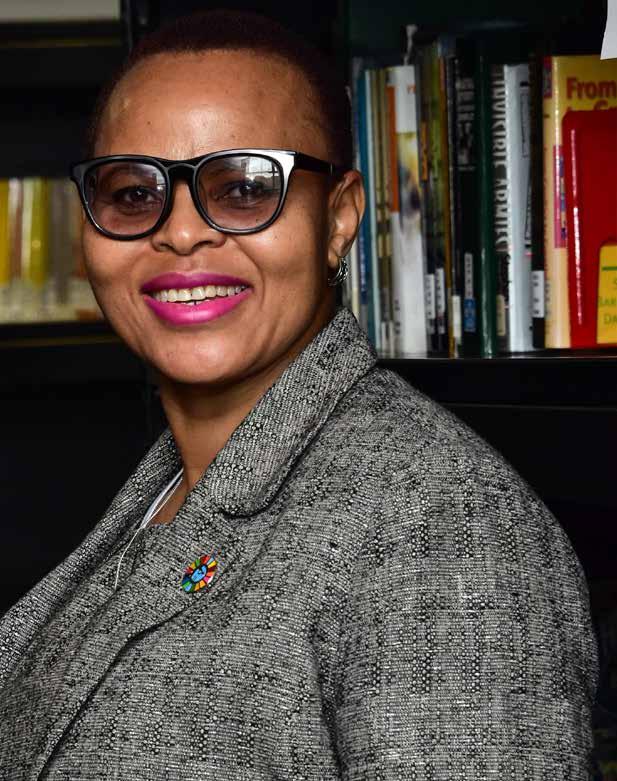

flies SA flag high

set to revamp the management of municipalities


16. Trailblazer
Equal access to healthcare a passion for young audiologist
Dr Zandile Shezi

Young South Africans pioneer a child safety App PasswordKid strives to protect school children
Government delivering youth employment at unprecedented scale Youth educator programme is making an impact in schools
Partnering to build a solid pipeline of future scientists and engineers Developing the skills of youth in STEM
A professional public service essential for a developmental state New framework is a game changer
18. Profiles in leadership
Saluting excellence: Turkiye honours SAPS K9 Rescue Unit

20. From the Union Buildings
Our immediate priority is to end cholera outbreak and ensure water for all
32. Bridging the digital divide through artificial intelligence Bots are becoming an essential tool for communication processes
34. SA awarded prestigious ISSA Good Practice Award
Recognising SA’s efforts in caring for its children
36. Working for water: improving the country’s water sector Agency to improving access to clean, safe water


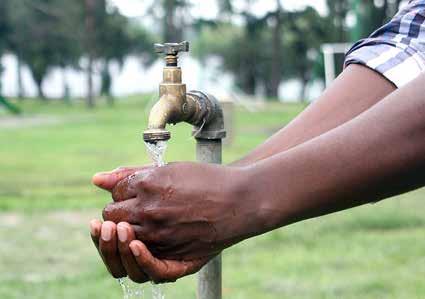


South Africa’s youth have a history of resilience. Their strength was demonstrated on 16 June, 1976, when thousands of schoolchildren stood up for their rights to a fair education. What started as a peaceful Soweto protest became a national uprising after the youngsters were met with atrocious police brutality.
The world reacted with horror, condemning and punishing the apartheid government. Global allies of the liberation movement strengthened their support and the freedom fight was reinvigorated. South Africa
would never again be the same.
As we commemorate their courage and sacrifice, we must also celebrate the youth of today, who show the same fortitude of spirit. Each year, we hear how disadvantaged matriculants defy their difficult circumstances to achieve multiple distinctions. We have also seen youngsters using their COVID-19 Social Relief Grant to start businesses and, in so doing, securing their future. We learn about unemployed people who succeed as entrepreneurs despite having

nothing but determination when they start.
One such young person is Namhla Dotwana, who created the Namhla Collection, an organic cosmetics and home spa range, from a home garage. She impressed judges in a funding pitch competition that she received R1 million in funding from the Small Enterprise Development Agency and today owns a successful online store. Zintle James saved money from the stipend she earned as an intern at the Eastern Cape Department of Education to buy two pigs. She received R45 000 in funding from the National Youth Development Agency and now owns 90 pigs, creating a bright future for herself.
Despite the challenging global and domestic economic conditions and South Africa’s high youth unemployment rate, youngsters like Dotwana and James are grasping the many youth empowerment opportunities created by government and its partners.
One of the most comprehensive programmes is the Presidential Youth Employment Intervention (PYEI), which moves young people from learning to earning. The PYEI is funded by the Presidential Employment Stimulus (PES), which was launched in October 2020
in response to the COVID-19 pandemic. Since then, the PES has delivered more than a million jobs and opportunities. Over 80% of beneficiaries are young people.
One of the most visible PES initiatives, responsible for 75% of all jobs created, is the Basic Education Employment Initiative, which places unemployed youngsters in schools for eight months as teaching assistants or general workers.
Another worthwhile interven-
tion is the Social Employment Fund, which is recruiting 50 000 participants to work with nongovernmental organisations in upliftment programmes, such as food kitchens.
More established programmes, such as the National Youth Development Agency (NYDA), the Expanded Public Works Programme, the National Student Financial Aid Scheme, and the Harambee Youth Employment Accelerator continue to help young people earn a livelihood.
Harambee and the NYDA are partners in SAYouth.mobi, a zero-rated online platform for the youth to access opportunities.
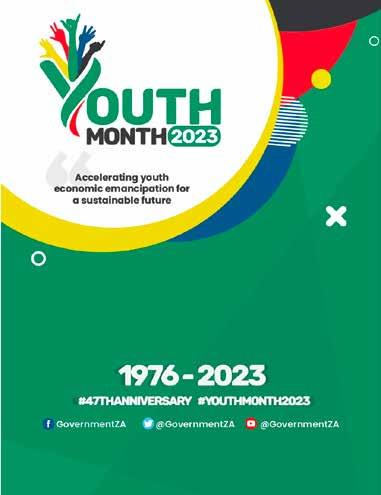
Part of the PYEI, this successful public-private partnership has over three million registered users.
Another private sector partnership is the Youth Employment Service (YES). Launched five years ago, it has placed more than 100 000 South Africans between the ages of 18 and 29 in local businesses for a year of work experience. In addition, the programme operates training hubs in several industries.
Leading by example, the public sector no longer requires that entry-level candidates (levels 1–5) have work experience. This will enable thousands of youngsters to get a foot in the door and start growing their careers.
Public servants must continue to run mentorship programmes, create internship opportunities and support youth-owned enterprises. As the largest employer in the country, the Public Service can be a powerful tool for change.
This Youth Day, in addition to celebrating that historic day 47 years ago, we must keep our public employment programmes top of mind and focus on championing the rights of our young people.

As the countdown builds to the 2024 National and Provincial Elections and we are in the last year of the Programme of Action of the Sixth Administration, it is important for us as leaders in the public sector to encourage citizens to vote.
The Bill of Rights grants all citizens aged 18 and older the right to choose who governs the country.
As public servants in our workplaces and in our communities, let us remind relatives, friends, neighbours, colleagues, Uber drivers and other compatriots the importance of voting – a simple, efficient, personal act with the power to change a country.
Within the context of government’s engagement with citizens, we are bound by the Constitution of the Republic of South Africa, 1996, which stipulates that South African citizens should be provided with information that is timely, accurate and accessible.
As such, departments and entities tasked with empowering citizens on how to vote should
prioritise campaigns like voter education to ensure that citizens understand their rights, the political system, as well as how and where they should vote.
This will, in turn, impact voter turnout.
Part of this message has to be the consequences of cynicism, the spoiling of votes or absten-
tion from the polls, because these behaviours come with several dangers that also have the power to change the country – for worse.
During the first democratic elections in 1994, voter turnout was 86.9%. Sadly, there has been a steady decline since, with 73.48% in 2014 and 65.99% in 2019. Youth participation is especially important, with the percentage of young people who voted in 2019 far below the national average.
According to Statistics South Africa’s 2022 mid-year population estimates, of the 60 million people in South Africa, over 14 million are young people aged between 15 and 29. The Electoral Commission of South Africa (IEC) notes that there are just under seven million registered youth between the ages of 16 and 29 on the national voters’ roll.
The declining voter turnout trend needs to be reversed because inclusive political participation is vital to a thriving democracy. If a large percentage of the population chooses not to
vote, politicians will be accountable to fewer people.
Abstaining from voting does not send a statement that you do not trust the system or that you feel powerless. It takes away your voice and give others the power to vote for candidates or parties that represent their interests, at the expense of yours. This needs to be the message driven home in voter education campaigns.
According to WomenWatch, a joint United Nations project created in March 1997 to provide an Internet space for global gender equality issues, “for an election to be successful and democratic, voters must understand their rights and responsibilities, and must be sufficiently knowledge -
able and well informed to cast ballots that are legally valid and to participate meaningfully in the voting process”.
This will be needed now more than ever because next year’s national election will herald a new dimension in South Africa’s political landscape, with the inclusion on the ballots of independent candidates. This follows the signing into law of the Electoral Amendment Bill of 2022 by President Cyril Ramaphosa in April.
The updated legislation provides the legal certainty required to prepare the country for the 2024 General Election.

Significant work still needs to be done by the Electoral Reform Consultation Panel and the IEC

to ensure that the Bill is properly supported by legislative and policy changes.
Over and above investigating the amendments needed to the Political Party Funding Act, 2018 (Act 6 of 2018) as a result of the amended Bill, the panel has been charged with making non-binding recommendations to further reform the electoral system, post the 2024 elections, and this too is exciting news for our democracy.
What can you as a public sector manager do to improve voter turnout? Imagine how many people could be reached if every manager in every department, across all tiers of government and in all government entities, become voting ambassadors,
encouraging and assisting people to register and holding dialogues with team members, family and friends on the importance of voting. One ripple can become two and ultimately a tsunami, spreading far and wide.
As former President Nelson Mandela said on the importance of citizens’ involvement in democratic processes, “since my release, I have become more convinced than ever that the real makers of history are the ordinary men and women of our country. Their participation in every decision about the future is the only guarantee of true democracy and freedom”.
The dire straits of the country’s municipal infrastructure demand pragmatic interventions at the highest level of governance.
It is a reality Mapatane Kgomo, the acting Chief Executive Officer (CEO) of the Municipal Infrastructure Support Agent (MISA), is patently cognisant of. This was apparent during a recent in-depth interview with Public Sector Manager (PSM) magazine at her office in Centurion.
A seasoned administrator, Kgomo was in April tasked with holding the fort by Cooperative Governance and Traditional Affairs Minister Thembi Nkadimeng. Her full-time job is as Deputy Director-General for Infrastructure Delivery Management Support at the agency, a position she has held since January 2020. Before this, she spent five years as head of business development and stakeholder relations at the Development Bank of South Africa. Between 2004 and 2015, she held director and chief director posts at the North West Department of Local
Government.
Speaking to PSM, the acting CEO described her appointment as “quite a huge responsibility”.
An agency of the Department of Cooperative Governance (DCoG), the MISA thrives on a programme towards improving municipal infrastructure provisioning and maintenance for accelerated service delivery. Its interventions are executed through the provision of technical capacity deployment such as engineers, town planners, project managers, and other built environment fields in various municipalities.
“MISA is relatively a small entity, we [should] ideally be supporting all 257 municipalities, but because of our capacity constraints, we have resolved that we will target most underresourced municipalities,” explained Kgomo.
With 2023 marking a decade since the MISA’s formation, the agency recently set in motion a process of developing its longterm strategy.
“We don’t want to create a dependency syndrome in the municipalities that whenever there is a problem, we send in experts to address a particular challenge, but as soon as that resource is withdrawn, the municipality goes back to its original state,” said the acting CEO.
The strategy, she said, will also look at sustainable mechanisms of how the MISA supports municipalities to ensure that they are capacitated while receiving support. It also addresses the issues of recruitment and attracting the skills sets, as well as empowering the youth.
“We have a young graduate programme and the artisans programme. We take youths that are unemployed and get them into apprenticeships, that way we are able to make a contribution towards growing that technical skills pool.
“The other area that we feel we need to be strong on as MISA, is to be able to directly intervene where there are challenges. The way we are structured as an organisation is that we are
not even able to raise capital because we are an entity of government,” she said, adding that there was some willingness from the private sector to partner with government on municipal infrastructure.
She was of the view that some grants should not be allocated to municipalities but rather be allotted to the agency for it to rollout the respective programmes.
“This is our long-term vision. We are only 10 years [old], [but] I see us doubling up what we currently have and currently do in terms of our mandate in the next 10 years, so that we are more visible and our impact is felt by municipalities,” she said. Due to the severity of challenges in some councils, the agency is, at times, required to have a “very hands-on” approach with regard to providing support, especially on infrastructure delivery.
She revealed that the organisation is also working to ensure that there is an improvement in the way municipalities spend infrastructure grants. “Some of these municipalities, because of
a lack of capacity, do not spend their infrastructure grants, which affects service delivery,” she added.
“We have also implemented some projects as interventions in areas where there is a dire need, especially in the water and sanitation sector. We have utilised some funding from our own budget to implement those water projects, especially in the most rural municipalities.”
These, she explained, had been capacitated with site teams for the equipping and drilling of infrastructure, such as boreholes.
Kgomo decried the deplorable state of infrastructure at municipal level, despite millions of rands in grant infrastructure availed to address such challenges.

One of the conditional grants that municipalities receive is the Municipal Infrastructure Grant (MIG), to eradicate service delivery backlogs. Chiefly, these relate to backlogs in water, sanitation, roads and electricity. The Acting CEO’s concern is that the money is used to build more new infrastructure at the expense of old and existing ones.
“Over the years, what we have noticed is that there is too much focus on building new infrastructure, there has been a lot of investment that has been made countrywide.
“Over time, this infrastructure is not properly maintained and operated. It then deteriorates to a point where it no longer serves the households with the required quality,” lamented Kgomo.
To remedy this defect, the MISA has proposed that National Treasury should introduce reforms on the use of the grants.
“Knowing the municipalities and the state at which they are in, they do not have the expertise and means to refurbish and repair and upgrade the infrastructure. We then built a case to National Treasury that part of the MIG must be utilised for infrastructure asset management. We also proposed that the policy
of the grant administration itself be reformed to accommodate the asset management element,” she said.
Kgomo added that the lack of capacity and financial resources in municipalities is also the reason for water and sewerage spills on the streets of most of these local authorities. Through the introduction of the reform, the agency now guides councils on how to plan for the usage of this portion of the grant for asset management.
To address the issue of under usage and misuse of conditional grants, the agency is working with municipalities that continuously face this challenge to ensure that funds are used to benefit residents.
“The money (if not used) then returns to the national fiscus. It is a worrying factor because it means services that communities are supposed to receive are going to get compromised as a result.
“What we have then done and resolved as a department [the DCoG] is that whatever grants that municipalities are unable to spend, the department would have to spend on their behalf. The law does make provision for that – the Division of Revenue Act, [2022, (Act 5 of 2022)],” Kgomo explained.
A 2021 state of local government report identified 66 municipalities as “dysfunctional”.
This is a category of municipalities with no proper governance structures, lax administration, poor financial management and a compromised and unreliable quality of service delivery. The report also revealed that this group of councils was also plagued by political instability. Of these, the MISA identified those that required direct intervention. These are municipalities that do not have the capacity to spend their grants.
nicipalities were “very weak”.
With concerns of poor governance consistently rearing their ugly head in the AuditorGeneral’s consolidated general report on local government audit outcomes, the agency has developed a programme to curb the scourge.
Through it, the MISA provides guidance and support on how municipalities can improve infrastructure procurement processes.
that is not cognisant of potential disasters. For example, the roads and bridges that are being built by municipalities, are being built in areas that are very prone to natural disasters.
“We have identified municipalities mainly in KwaZulu-Natal and the Eastern Cape, because those are the two areas that are more prone to flood disasters. We are supporting them in a way that whenever there is a flood, the infrastructure is not affected. It is a priority for us,” explained Kgomo.
The agency has also partnered with the National Disaster Management Centre to build municipal capacity in this regard.
“Some municipalities do not even know the infrastructure that they have because it was built [so many] years ago,” she said, adding that reforms being introduced in the MIG will also enable municipalities to identify their infrastructure assets.
“There is a programme that we have put in place to ensure that the funding that goes to these municipalities is not used for the wrong reasons and that it does not get returned back to the national fiscus," she said.
Kgomo revealed that the agency has, over the years, noted that procurement processes in mu-
In recent years, perilous infrastructure at the local government sphere, which is at the coalface of service delivery, has been left battered by severe natural disasters. These events, said Kgomo, were testing the resolve of meagre resources, revealing that the agency has come up with a programme to address this challenge.
“Municipalities have been planning their infrastructure in a way
“If you do not know where your assets are, you will not even know their condition. You will not know when the assets are broken, you will just see sewers spilling," she said.
She added that the challenge is so deep that even metropolitan municipalities are struggling.
“You would think that metros would be in a position to know and maintain their assets, but it has become a phenomenon that even they are battling with”.
“There is a programme that we have put in place to ensure that the funding that goes to these municipalities is not used for the wrong reasons and that it does not get returned back to the national fiscus."


Raising awareness about critical issues that affect the youth and advocating for their development has always been Dr Bernice Hlagala’s insatiable desire. She has been involved in youth development throughout her career of more than 20 years. Having started her career journey as a social worker, Hlagala ascended the corporate ladder over the years and is now Chief Director for Youth Development at the Department of Women, Youth and Persons with Disabilities (DWYPD).
The DWYPD has a mandate to regulate the socio-economic transformation and implementation of the empowerment and participation of women, youth and persons with disabilities. It is responsible for the advocacy and mainstreaming of the rights of women, youth and persons with disabilities.
As a Chief Director, Hlagala is responsible for overseeing the development of the organisation-wide youth development strategy and implementing its monitoring and evaluation framework.
She provides strategic leadership to ensure that there are advocacy instruments like legislation and policies in place for youth development.
“I also support stakeholders in all spheres of government to
come up with their own strategies that align with the strategies that the chief directorate has developed,” she said.
Essentially, the chief directorate exists to ensure the mainstreaming of policies and programmes within various sectoral departments to ensure that they become an integral part of the policies of various sectors, and that programmes and policies are biased towards youth empowerment.
As an experienced policy maker, Hlagala has managed and ensured the approval of the National Youth Policy (NYP) for the periods 2009 – 2014; 2015 –2020 and 2020 – 2030. She has also ensured the approval of the Monitoring and Evaluation (M&E) Framework for the NYP; and the National Youth Service Framework.
“The first NYP was approved under my watch, and that is something that I am proud of. I have been able to review it twice and went further to put the M&E Framework for the NYP in place,” she said.
The department uses the NYP 2020 – 2030 to support the work of its entity, the National Youth Development Agency.
The NYP 2020 – 2030 has
five key priorities, and Hlagala said there has been progress recorded in some areas, while more still needs to be done to address persistent challenges affecting the youth. These include:
1. Quality education, skills development and second chance programmes:
“South Africa is recording an increased enrolment of young people in the education system because the majority could not afford university fees in the past, but now they have access to free higher education, thanks to government interventions,” she said.
2. Economic participation, job creation and entrepreneurship: Because unemployment is stubbornly high in the country, and the fact that the youth make up the majority of the population, it means many of them are unemployed. Hlagala believes that entrepreneurship is one vehicle through which young people can get employment because the economy is currently not creating enough jobs for citizens. She believes that entrepreneurship is supposed to be taught from as early as primary school.
“We cannot expect the majority of our youth to learn entrepreneurship now when they are a little grown up, because that is when they are supposed to be running actual businesses,” she said.
3. Physical and mental health: This includes combating issues such as gender-based violence and femicide (GBVF) and COVID-19. “Due to many problems facing the youth, many of them resort to alcohol and substance abuse, they battle with depression and other mental illnesses, and some even see suicide as an answer to their problems,” she said. She acknowledged that government does not even have adequate services in communities to assist with this challenge. “Some of the diseases that affect our youth’s physical health are also related to risky lifestyle, among other reasons, including HIV, diabetes, cancer and others,” she said.
She added that teenage pregnancy is also high in the country, and it also affects the education of the youth and it further perpetuates intergenerational
poverty, the risk of continued GBVF due to unresolved traumas that young people grow up with.
4. Social cohesion and nation-building: Hlagala said South Africa is not as cohesive as government wants it to be, noting that most of the outreach programmes she has been part of are predominantly attended by the black youth while other racial groups are not represented.
“We are still organised alongside the racial lines. Another factor is that many young black people are migrating from rural areas to urban areas. This move has its own challenges because they are leaving behind communities that do not have resources,” she added.
“This does not contribute to nation-building because
young people actually become divorced from their own families and communities. They also feel alienated from their families because there is lack of support once they move away from their families,” she said.
5. Effective and responsive youth development machinery: According to Hlagala the country needs youth workers who are well capacitated to run sustainable institutions, but the challenge is that youth development work is not recognised as a profession in South Africa.
“Although there are institutions that offer youth development qualification, it does not help that it is not recognised as a profession in the country. Within every professional sector, we need to have youth
development workers,” she said.
With regard to monitoring and evaluating the implementation of the NYP across all sectors, Hlagala said the public sector responds well to requests for data on progress made in implementing youth development programmes but the private sector and other civil society organisations are not as responsive.
While South Africa continues to increase efforts to combat GBVF, a lot of citizens suffer from the bystander effect, or bystander apathy – a situation where individuals are less likely to offer help to a victim in the presence of other people.
Hangala has called on the youth not to be part of this social challenge, encouraging them to go back to their primary values of
Ubuntu and emulate the selflessness of the youth of 1976.
“They fought for our democracy and liberation, which they did not even benefit from. It is the generations that came after them who benefitted. You cannot stand back and do nothing while the next person is being violated,” she said.
“Our justice system must also improve in order to encourage more people to speak out and act against abuse,” she added. Hlagala’s work over the years has ensured the signing and ratification of the African Youth Charter and hosting the first and second Commonwealth conferences on Education and Training of Youth Workers in South Africa. For her outstanding work, she has received the All-America Scholar Award; Africa Region Best Commonwealth Youth Worker’s Award; and the overall winner for the Pan-Commonwealth Youth Worker’s Award in the past years.
She obtained a PhD from the University of Pretoria; Master’s in Social Work from Howard University in the United States; Bachelor in Social Work from the University of Venda; National Diploma in Public Relations from the University of South Africa; and a Certificate in Management from Technikon South Africa.
“We are still organised alongside the racial lines. Another factor is that many young black people are migrating from rural areas to urban areas. This move has its own challenges because they are leaving behind communities that do not have resources.”

Achance encounter with audiology at university birthed in Dr Zandile Shezi a burning desire for universal access to hearing implant services for all patients, regardless of socioeconomic status.
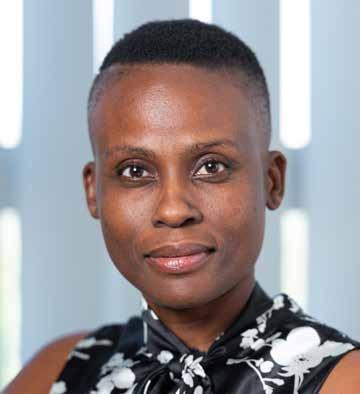
The service, she told the Public Sector Manager (PSM) magazine in a recent interview, should not be reserved for the privileged few.
Shezi, who holds a PhD in the discipline, was, in May, part of a specialist medical team that switched on the cochlear implants of two patients at the Inkosi Albert Luthuli Central Hospital, under the KwaZulu-Natal Health Department's new auditory implant programme.
The 37-year-old, who has extensive experience in the Public Service, doubles as an audiology lecturer at the University of KwaZulu-Natal (UKZN) and coordinator and lead audiologist in the KwaZulu-Natal Auditory Implant Programme (KZN-AIP).
The recipients were Xolani Sikhosana (43), who lost his sense of hearing after developing an undisclosed ailment and two-and-a-half-year-old
Uminathi Mafisa, whose family had to endure an anxiety-filled 18 months after the toddler lost her auditory senses at just six months old.
The two were among the first
10 patients to benefit from the KZN-AIP, since its launch in March 2021. The programme is a collaboration between the KwaZulu-Natal Department of Health and the UKZN, and draws on the expertise of ear, nose and throat surgeons and audiologists. It also includes deaf community advocates. It was premised on a vision to
see people-centred ear and hearing care become accessible to all.
Shezi said the programme was of significant importance. She takes pride in being part of a team that is changing people's lives.
“We are intentional about providing a service that is globally recognised for excellence in research, education and clinical practice, as well as relevant to our local African context.
“The team thrives on accessibility to auditory implant services for all patients throughout KwaZulu-Natal, regardless of context or socio-economic status, as the narrative is, hearing is not a privilege, it is a fundamental right. The programme is based on the spirit of ‘Ear and Hearing Care for All’,” she told PSM.
Reflecting on her journey in audiology, Shezi reminisced how she landed in the medical
discipline by chance.
“My path was directed by God into audiology. I stumbled into the department of audiology with my mom, after I matriculated, trying to find some space within the university. On the day I arrived, interviews were being held for potential students,” she recalls.
It was then that she remembered she had included the degree in her application.
“I had included it as an option on my CAO [Central Application Office] form but I had no clue what it was about. I saw that I qualified because of the science and maths requirements. So the lady who attended to me on that day asked for my CAO number. I shared it with her and was then called to write a test and interview the following day. So I am not sure if I chose it or it chose me,” she said.
Speaking about the recent surgery, she said being part of the team had been a privilege and an honour.
“I feel very privileged and honoured as I work with an amazing team. I think what is amazing about our team is that we are a group of health professionals who are likeminded in the sense that we all want better ear and hearing care services for our patients regardless of background,
context or socio-economic status.
“We are keen on ensuring that our services are quality-driven, available and accessible to all our patients regardless of the context they come from. There should be no difference in the patient's experience in terms of public or private sector when receiving the services.”
She added that it was always humbling to be part of the entire surgery process, saying she understands that she was part of a procedure that was life-changing.
“I can only imagine what this will do for the patient, their entire family and quality of life,” Shezi said.
In the procedure, the audiologist does the intra-operative testing.
“The tests that I do give us an indication of the integrity of the insertion of the electrode. So when I get good impedances and autoNRTs [an automated system that measures electrically evoked compound action potential thresholds from the auditory nerve with the Nucleus Freedom cochlear implant], I always feel like dancing and rejoicing on behalf of the patient. My reaction is always of gratitude because so much can happen during a surgery,” she detailed.
Reiterating the importance of the programme, Shezi said accessing specialist medical procedures should not be a service reserved for only those with deep pockets.
“This [programme] will mean that we are all equal regardless of our socio-economic status, context or background. It will mean that everyone deserves to hear because nobody would ever choose deafness or hearing loss.
“Our patients do not choose to be deaf as some are born that way and some acquire the hearing loss for various reasons, sometimes beyond their control,” she said.
The team’s first cochlear surgery was performed in 2021, on two adult patients.
“This is not to say that we do not have children born deaf, but rather our current health systems do not allow for us to catch them early or at an early age that we know scientifically they would still benefit from the cochlear implant. They reach us very late when we cannot do much for them with cochlear implants as they are above the age of the standard criteria,” Shezi said.
She decried the lack in comprehensive health screenings that include issues such as auditory senses.
“... not much is done [on health screenings]. There have been attempts for hearing screenings to be facilitated, however, until we have a Universal Newborn Hearing Screening (UNHS) programme in South Africa, we will never obtain the outcomes we desire when it comes to cochlear implants,” said Shezi.
Until this is achieved, the country “will never obtain the benefits of improved speech and language development, academic performance, socio-emotional development, cognition and employment opportunities.”
She said the lack of the screening programme in South Africa takes away the opportunity to benefit from evidence-based treated hearing loss.
“There is research that has proven the return on investment and cost-effectiveness of cochlear implants. The UNHS facilitates early identification, which leads to early intervention, because untreated
hearing loss in South Africa is costing the government a lot when you look at healthcare, education and [the] cost of loss of productivity,” she said.
Helping one another in a time of crisis is perhaps one of the world’s most widely understood languages.
In April, the South African Police Service’s (SAPS) K9 search and rescue team was honoured for their courageous work, following a deadly earthquake that rocked Türkiye and neighbouring Syria.

The world responded to the disaster by sending rescue
teams. The SAPS K9 team, together with the Gift of the Givers Foundation, also joined in on the rescue efforts.
Like other rescue teams, what was top of mind for the team, was finding survivors and recovering the bodies of deceased victims.
Brigadier Vimla Moodley, who is the provincial Head for Police Emergency Services which is responsible for K9, divers and
mounted units in the Eastern Cape, was tasked to lead the well-prepared K9 team to Türkiye.
She recalled how the team was in good spirits and eager to depart and commence work to save lives.
The team was made up of herself, five dogs and their handlers.
The team was deployed to the city of Antakya, located in the
province of Hatay.
“The earthquake caused a disaster of such a magnitude, that of such a magnitude that a whole city was destroyed. It was more like an apocalypse had befallen the city.
“It was our first experience of such a nature and due to the calibre of handlers we have, it is an experience they will never forget. However, they [handlers] are mentally strong and have appreciated life more now and also the fact that we do not experience such disasters in our country,” she said.
The SAPS K9 search and rescue dogs are trained and used to search for missing persons and recover human remains, as they are able to detect. They also detect human scent and
remains and are able to find victims of floods and collapsed buildings.
Asked about what training was put in place prior to their departure, Moodley explained that the team is trained for such purposes. The handlers are also assessed, moderated and certified annually.
“[The] only planning is the medical check-up by a veterinarian for the dogs and relevant medication should the need arise,” she explained.
Among the successes achieved by the team was the recovery of an 80-year-old woman who was found alive in a collapsed building.
The team’s efforts were rewarded with a Medal of Supreme Sacrifice bestowed by Turkish President Recept Tayyip Erdogan.
The mother of three flew back to Türkiye to receive the medal on behalf of the SAPS in April.
“I was totally honoured [to] represent my country, especially the SAPS and personally being bestowed by the President of the country with a medal of supreme sacrifice. It was an incredible experience,” she gushed.
The team also received praise from National Police Commissioner, General Fannie Masemola, who described it as the epitome of pockets of excellence that exist in the
organisation. He said the team had displayed commitment and dedication to the cause of serving.
Moodley joined the SAPS in April 1991. She later applied to join the K9 unit in Durban. Having met the necessary criteria, Moodley became the first woman of colour to be placed at a K9 unit in the country the following year.
She was trained as a patrol and explosive K9 handler and served as an operational member until she was promoted in 2000 as the provincial coordinator for K9 and Mounted Units in KwaZulu-Natal.

“I further applied for a K9
unit commander post at the East London K9 Unit and was successful and promoted to superintendent, [which is] now [known as] lieutenant colonel in 2005.
“In 2015, I was promoted to the Provincial Commander Police Emergency Services in the Eastern Cape, which has a larger porfolio inlcuding; K9, mounted, diving and search and rescue, hostage negotiations, disaster management, 10111 call centres and Flying Squad”.
Moodley, who has a passion for working with animals, was promoted to the rank of Brigadier in February 2023. She has served the SAPS for a total of 32 years.
“Search and rescue is close to my heart [the] duties require [one] to be mentally strong due to the horrific things they experience and see,” she said, adding that the handlers were all doing well following the mission.
Following the team’s heroic work, a dinner in honour of the team and the Gift of the Givers was held at the Turkish ambassador’s residence in Pretoria in May.
Asked about the lessons learnt from the experience, Moodley said: “Appreciate life more and the simple things. Life is short and a disaster can take away everything in a second.”
Recent outbreaks of cholera in Hammanskraal in Gauteng and in the Free State have shown the vital importance of safe and effective water and waste water management.
The deaths of people in Gauteng and the Free State are deeply tragic. Our thoughts and prayers are with the families who have lost their loved ones. Hundreds more people have been hospitalised following the outbreak.
Earlier this year, the World Health Organisation (WHO) and international relief organisations warned that after years of steady decline, cholera has made ‘a devastating comeback’, putting over a billion people in 43 countries at risk.
According to the WHO, 24 countries have had reported cases since the beginning of the year, including in parts of Malawi, Mozambique and Zimbabwe.

Authorities are to be commended for their efforts to
speedily assist all those affected, including setting up a field hospital in Kanana in Hammanskraal, providing additional water tanking services to residents and going into communities to raise awareness about proper hygiene.
An investigation is underway into the source of the outbreak. Technical teams from the City
of Tshwane, the Department of Water and Sanitation (DWS), and the provincial and national departments of Health are carrying out water quality tests at distribution points and at water treatment works in the area.
They are also tracking and tracing infections. To date, the original source of the cholera infection has not been located.
However, this waterborne disease is highly transmissible in conditions where there is inadequate access to clean water and sanitation facilities.
Unreliable and poor-quality drinking water has been a problem in Hammanskraal for many years. The Rooiwal Waste Water Treatment Works, which is upstream of Hammanskraal, has not been well-maintained and has insufficient capacity to deal with the volume of waste water entering the works.
Over the years, in its role as the regulator of the water sector, the DWS has issued many directives to the City of Tshwane to address pollution from the Rooiwal Waste Water Treatment Works. Regrettably, these directives were not acted upon. Consequently, the Department initiated legal action to force the city to use its grant from national government to refurbish and upgrade the waste water treatment works.
While there must be full ac -
countability for the failings that have resulted in the outbreak in Hammanskraal, at this time we must focus on the problem at hand. We must stop the spread of cholera and take remedial measures to safeguard human health.
Generally, water quality in South Africa is of a high standard, which, according to our Water Research Commission, “compares well with the best in the world”. It is important to note that the dual water systems supplied by Magalies and Rand Water to the Tshwane area meet national standards.
After they were abandoned nearly a decade ago, government reinstituted the Blue and Green Drop programmes to help improve national water quality and to assist municipalities with compliance. This formed part of Operation Vulindlela, a collaboration between The Presidency, National Treasury and government departments to fast-track economic reforms.
The most recent Green Drop Report shows there has been a steady decline in the quality of water and sanitation services in municipalities. Poor governance, ineffective management, increasing debt and underspending on public infrastructure like wastewater treatment
plans have all contributed to poor water quality.
Under these circumstances, the fact that many councils underspend critical infrastructure grants is unacceptable.
Across the country, the DWS is working with municipal managers and technical teams to ensure local councils use their water infrastructure grants effectively. Support is being provided, among others, to water infrastructure projects like the Nooitgedacht Water Transfer Treatment Scheme in Nelson Mandela Bay, the Greater Mbizana Regional Bulk Water Scheme in the Alfred Nzo District Municipality, and a number of projects in Malutia-Phofung in the Free State, and Emfuleni and Midvaal local municipalities.
National government and Umgeni Water are helping eThekwini Metro to improve the management of its waste water treatment systems. Similarly, the Drakenstein Municipality in the Western Cape and the Lekwa Municipality in Mpumalanga are being helped to address waste water treatment system challenges.
As announced in the State of the Nation Address in February, government is proceeding with a number of significant projects to improve our national bulk
water resource infrastructure. Last week, I was in Lesotho to mark the start of construction of the second phase of the Lesotho Highlands Water Project, which will supply water to Gauteng and its surrounding areas.
As we wait for the results of the investigation into the cholera outbreak in Hammanskraal, it is critical that local government authorities continue to work closely with national government to address and overcome the immediate challenges with water quality in Hammanskraal.
It is encouraging that the City of Tshwane and the DWS are working together to ensure the various water supply systems meet drinking quality standards.

Quality water and sanitation
is fundamental to the dignity of every South African.
I have, therefore, asked the Minister of Water and Sanitation to make recommendations to strengthen the governance, management and regulatory framework for municipal water and sanitation services. This includes ensuring that national minimum norms and standards are comprehensive, adequately monitored and adhered to by all water service providers.
Disease outbreaks such as the cholera outbreak in Hammanskraal are made far worse in situations of poor governance, weak management and poor maintenance of infrastructure. We have responsibility – and are determined – to remedy those shortcomings in a sustainable way and as a matter of urgency.
Many children are at risk of being abducted when their parents or guardians are unable to pick them up from school. To address this challenge, two young people have come up with an innovative idea to ensure child safety in schools.
Ntokozo Hlomuka (26) and Keletso Lekwakwe (24) are the founders of PasswordKid, a system that helps to verify parents, transport drivers or trustees when they pick up children

from school.
“Through the PasswordKid App, parents are able to register a delegate that they trust to pick up their child from school,” explained Lekwakwe, who is the Chief Executive Officer of PasswordKid.
This means that only authorised people with parental rights or approved delegations can gain access to and pick-up the child from school.
This innovative idea was
inspired by similar experiences of the pair regarding child safety, and they also share the same vision of protecting children.
Hlomuka who hails from Soshanguve in Pretoria, has previously worked as an assistant at his aunt’s Early Childhood Development (ECD) centre.
“I realised that many parents who worked a little far from their children’s schools would run late to pick up the children, and they would sometimes ask other
adults to fetch their children in order to avoid paying for aftercare. In this case, it becomes difficult for ECD teachers to verify who is authorised to collect the child,” said Hlomuka, who is the Chief Technology Officer at the company.
His business partner, Lekwake, originally from Rustenburg in the North West, used to alternate with his mother to pick up his younger brother from pre-school few years ago, but sometimes
the child would be stranded because of miscommunication between the adults.
Because of their shared concerns around child safety, the two friends, who met while studying towards a Bachelor of Science in Information Technology at Richfield Graduate Institute of Technology in Pretoria, decided to come up with a business solution to address this challenge.
“We conducted research and the results gave birth to PasswordKid,” said Lekwakwe. How it works:

• Download the App and register the person who is supposed to pick-up the child from school by punching in their identity (ID) number and other details, as well as details of the child.
• The ID of the delegated person must be scanned using the App and be accepted as a designated party with access to the child.
• When the delegated party gets to the school, they present their ID and the teachers at the school will scan their ID to confirm the pickup.
• Once the ID has been confirmed, the person will be required to provide a one-time PIN generated and sent to them by the App to confirm
that they have been authorised to pick up the child.
“The app also works for transport providers, who in many cases collect kids from school. They must be registered by parents,” explained Lekwakwe.
The system is currently being rolled out in ECD centres and primary schools Gauteng, but Lekwakwe believes that it will eventually be rolled out across the country as the business grows.
Installation cost for the PasswordKid Station at school is a once off payment of R8 459. App users pay a monthly fee of R39.99 per month per child which is billed to the parent. There is also a once-off registration fee of R59.99.

The PasswordKid App was among the winners of the 2022 Gauteng Accelerator Programme Innovation Competition hosted annually by the Innovation Hub – a subsidiary of the Gauteng Growth and Development Agency. It was established by the provincial government through its Department of Economic Development to promote economic development and competitiveness in the province through fostering innovation and entrepreneurship.
The hub also offers a number of incubation programmes in the bio-economy (agro process-
ing and pharmaceutical), smart industries (information commu nication technology (ICT) and advanced manufacturing) and green economy (water purifica tion, waste management and renewable energy).
It operates a range of en terprise development, skills development and innovationenabling programmes both in the science park and throughout Gauteng.
Every year, the competition looks for innovators, researchers and entrepreneurs who work on novel technologies that improves the efficiency of service delivery, increase the competitiveness of
the local economy and enhance the quality of life of ordinary citizens.
Categories that are normally part of the competition include ICT, medical, biosciences, green and township economy.
For more information, visit www.passwordkid.co.za email info@ passwordkid.co.za or WhatsApp/call: 0672462328. You can also visit www.theinnovationhub.com for more information.
assistants support teachers in the classroom or are deployed to assist with administration or support school’s information technology (IT) as e-cadres. Beneficiaries need to have a matric certificate but young graduates are prioritised. General Assistants are not required to have a matric certificate. They assist with tasks such as school maintenance, security, food gardens, sports and after-school care.
The training options available for school assistants have strengthened with each phase.
As of May 2023, a further 100 000 school assistants started their placement at schools across the country, bringing the total number of youth placed in employment opportunities through the Basic Education Employment Initiative (BEEI) up to 850 000.
Run by the Department of Basic Education (DBE), BEEI forms part of the Presidential Employment Stimulus. It is currently the largest youth employment programme in South Africa’s history – in response to the unprecedented scale of the youth unemployment crisis. The
programme reaches every corner of the country, with over 850 000 young people having benefited from access to work experience, in a context in which the lack of this on their curriculum vitaes is often a barrier to employment.
The BEEI includes opportunities for all skills levels. Education
“They are so good at technology, they are [even] teaching the teachers”, relates Lala Maje, National Project Lead for the programme at the DBE.
The assistants are trained to support the delivery of core curriculum priorities, such as maths and science outcomes. Many become reading champions – with the National Education Collaboration Trust crediting

these with strengthening the culture of reading in schools, by running reading groups, setting up library corners, reading stories and giving one-on-one support to struggling learners. As one participant posted on social media, “My CV is no longer empty. Before this programme it was blank, now it has five certificates”.
This year, government is introducing entrepreneurship education. School assistants will support learners while also getting a chance to explore this as a career beyond the programme.
The programme’s impact is being displayed mainly on social media platforms as beneficiaries share their achievement. The DBE has embraced the platforms and uses them to provide feedback and engage the youth. There are pictures of housing improvements, posted with pride by participants who give credit to the programme. There are pictures of graduation ceremonies, with thanks to the programme for enabling payment of outstanding fees. While the programme has provided much needed income, participants have also pointed to how it has empowered them with a deeper understanding of the world of work and prepared them for the
workplace.
Participants take pride in the work undertaken too: posting photos of reading corners and libraries established, and videos of newly-trained sports enrichment coaches running exercise classes, before-and-after pictures of barren school grounds now bursting with cabbages, dull and dilapidated classrooms gleaming with new paint, and
participants at laptops doing school administration.
Principals and teachers are champions of the programme, with surveys showing their support for the programme has remained consistently above 93%. Teachers say that the school assistants bring energy, enthusiasm and passion into schools; they also say that their support gives them more time to
After completing the programme, school assistants exit into a tough labour market. Much effort continues to go into supporting them to transition to other opportunities. The DBE has promoted Funda Lushaka bursaries and other scholarships for those who want to pursue careers in education.


One such beneficiary is Lisa Sikhosana who worked as a school assistant in the first phase of the programme. She is currently studying teaching though UNISA.
There has been CV-writing support, letters of reference from principals and engagement with stakeholders, including in the private sector to encourage all who can to assist the young people to find pathways to new opportunities – and to post such opportunities on SAYouth.mobi. The sector has absorbed some into literacy, library and afterschool programmes while some are now self-employed as tutors. As the programme matures, the scope to deepen its impacts is also growing, including the potential for it to help move the dial on critical learning outcome areas.
young people can be mitigated through meaningful training programmes that enhance their skills.
CSIR senior engineer Prisha Mandree has first-hand experience of the importance of investing in young professionals as supervisor of an intern under the YES programme.
The Council for Scientific and Industrial Research
(CSIR) has shown that strength in partnerships not only applies to jointly developing or localising technologies, but also to building a strong pipeline of young
professionals in science, engineering and technology.
A partnership between Youth Employment Services (YES) and the CSIR is a testament to how national challenges like the high unemployment levels amongst
“The youth are finding it increasingly difficult to find employment due to a lack of work experience, and this is exacerbated by the many challenges currently facing South Africa. The relationship between YES and the CSIR gives young people a chance to get practical training in the fields of science and engineering, which contributes to them being more marketable,” said Mandree.
The partnership, which started in 2020, resulted in 55 experiential learning opportunities for YES youth placed at the CSIR. Of the 55, 14 young people were placed with small and medium-sized enterprises (SMEs) that have, at some stage, been supported by the CSIR’s industry-facing centres, such as the Biomanufacturing Industrial Development Centre (BIDC), the Biorefinery Industry Development Facility, the Photonics Prototyping Facility and the Nanomaterials Industrial Development Facility, with process and product development.
Two young professionals were placed with the CSIR’s bioprocessing research group and two with the biorefinery research group in KwaZulu-Natal.

“We placed the selected candidates with SMEs because of the increasing need to assist these enterprises with additional manpower to grow their companies and increase revenue. In turn, interns stand to gain a wealth of experience from working alongside entrepreneurs,” explained BIDC Programme Manager Lara Kotze-Jacobs.
“My experience as a CSIR intern has been nothing short of amazing. I have gained experience in biosciences and the process of

producing bio-based materials, which is very valuable for the career path I want to follow.
“The CSIR workforce has been friendly and welcoming, and it has been easy for me to learn and adjust quickly because the environment is conducive to rapid learning. The opportunity that the YES programme and the CSIR have provided me with, has served as a great career foundation for me, and I will forever be grateful,” beamed Thembelihle Mdakane.
Sharing these sentiments is Alley Maluleke from Ga-Molapo in Limpopo. “I get to work with
instruments in the lab on a regular basis, which means that I now have experience in operating many of the sophisticated equipment in the lab. I have thoroughly enjoyed working with a supportive and diverse team; I feel that by the time I complete my internship, I will be fully equipped with all the skills I need to build my career.”
CSIR Senior Researcher, Dr Ghaneshree Moonsamy, who also supervises interns, said it has been an enriching experience to contribute to the skills development, training and workplace exposure of the interns.
“Most young graduates are willing to learn and develop themselves; they merely seek an opportunity to further their skills and gain work experience. It is indeed a privilege to positively impact their personal development,” he said.
The YES programme interns at the CSIR come from Gauteng, KwaZulu-Natal and Limpopo. Before being placed, each of them went through a rigorous interview and selection process.
During the 12-month internship period, they are equipped with suitable skills for industry uptake and receive a monthly stipend.
The Department of Public Service and Administration’s 2023/24 Budget Vote
Speech highlighted the approval of the Professionalisation Framework for the Public Sector as its key feature. The framework has been described as a game-chang-
er in achieving government’s priority of building a capable, ethical, and developmental state.
During the presentation, Public Service and Administration Minister Noxolo Kiviet pointed out that the framework is a ground-breaking approach

that requires the full participation and implementation of all sectors, including the 10 legislatures, local government, national and provincial departments, and government-owned entities.
She revealed that plans to im-
plement the framework were on track and highlighted four principles that will guide its execution.
These are:
The Minister emphasised the need to establish measures
that regulate the tenure of heads of government departments (HODs) – to ensure stability and continuity within leadership positions in the public sector. By implementing specific guidelines, the framework seeks to prevent frequent changes in leadership positions, which can disrupt the functioning and effectiveness of government institutions. Stable leadership allows for the development and implementation of long-term strategies, fostering consistency in decision-making and policy implementation.
Moreover, establishing tenure regulations helps to safeguard against political interference and undue influence in the appointment and dismissal of people in leadership positions.
By setting clear guidelines and criteria for tenure, the process becomes more transparent and less susceptible to manipulation. This, in turn, enhances the credibility and integrity of leadership positions, ensuring that they are occupied by individuals who possess the necessary qualifications, skills and experience.
Tenure regulations can contribute to building institutional memory and expertise within government departments. When HODs have longer tenures, they can accumulate valuable knowledge about the
specific challenges, dynamics, and intricacies of their respective departments. This deep understanding enables them to make more informed decisions, provide effective guidance to their teams and implement sustainable policies.
is regulated and tied to their performance is expected to incentivise effective leadership, responsible decision-making, and the achievement of desired outcomes. It can also create a culture of performance and results-oriented governance
Minister Kiviet also highlighted the significant step of abolishing experience requirements for entry-level posts (levels 1 to 5) within the public sector. The decision was inspired by the pronouncements made President Cyril Ramaphosa in his State of the Nation Address earlier this year. The objective of this move is to promote equal opportunities and foster a more inclusive recruitment process.

This will address potential barriers that may hinder individuals, particularly those from disadvantaged backgrounds and young professionals from entering the Public Service. The removal of experience requirements opens entry-level positions to a wider pool of applicants, allowing for a more diverse and inclusive recruitment process that would foster an intergenerational mix.
The establishment of tenure regulations also facilitates the continuity of ongoing initiatives and projects. Often, long-term projects require consistent leadership and management to ensure their successful completion.
Knowing that their tenure
within the public sector.
The framework outlines specific criteria for the appointment and dismissal of accounting officers, including qualifications, experience, demonstrated leadership capabilities and performance evaluations.
It provides an opportunity for individuals who possess the necessary skills, qualifications and potential but may not have had the chance to accumulate significant professional experience.
This shift ensures that hiring decisions are based on merit, skills, and potential rather than solely on experience, creating a level playing field for all can-
“Often, long-term projects require consistent leadership and management to ensure their successful completion”.
didates but more importantly impacting, significantly on the challenge of youth unemployment.
Pre-entry tests and competency assessments, which are already implemented in certain areas, will be extended to cover the entire Public Service. This aims to ensure that individuals entering government roles possess the essential skills and competencies required to perform their duties effectively. This will enhance the quality and professionalism of the Public Service. The assessments will be used to evaluate the aptitude, knowledge, and capabilities of prospective employees before they are appointed. This measure will ensure a standardised recruitment process based on merit within the public sector. Implementing pre-entry tests and competency assessments will ensure that candidates have the necessary foundational knowledge and skills related to their specific roles. These assessments will cover a range of areas, including technical expertise, problem-solving abilities, communication skills and ethical decision-making.
It is important to note that
while these assessments serve as a screening tool, they should be complemented by other factors, such as interviews and reference checks, to ensure a comprehensive evaluation of candidates.
The Minister also announced the introduction of a revised performance management and development system (PMDS) specifically designed for public sector HODs. This aims to provide clearer guidelines and

expectations for these managers’ performances, ultimately enhancing accountability and effectiveness in their leadership roles.
The revised PMDS is expected to provide clearer guidelines on performance expectations, ensuring that HODs have a comprehensive understanding of their key deliverables and targets. This intervention will set clear performance metrics, including measurable targets and key performance indicators, as the system enables objective evaluation of the HODs' performance.
The revised system is also expected to incorporate
mechanisms for ongoing personal development and growth, including provisions for regular performance reviews, constructive feedback, and opportunities for skills enhancement and professional development. Moreover, the system will foster a culture of excellence and professionalism within the Public Service. Effective performance management promotes a sense of pride, motivation, and dedication. This, in turn, creates a positive ripple effect throughout the system, fostering a high-performing and results-oriented organisational culture.
Treat or sterilize the water before drinking or cooking

BOIL: - Bring water to boiling point for at least 1 minute. -Boiling water is an effective way of making water safe.

TREAT: - Put 1 teaspoon of household bleach into 25 litres of water. -Put 2 drops of household bleach in 1 litre of water. -Wait for 30 minutes before use.
-Always store your treated water in a clean, covered container.

Ensure proper hand hygiene
• Before, during, and after preparing food
• Before and after eating food or feeding your children
• After using the toilet
•
• After taking care of someone who is sick with diarrhoea
Cook food well and keep it covered
• Eat foods that have been thoroughly cooked and are still hot
• Peel fruits and vegetables
• all the way through.
• Avoid raw vegetables and fruits that cannot be peeled.

In today's digital age, technology has transformed the way a sender and receiver – everyone has the potential to be a sender.
the use of chatbots powered by Generative Pre-trained Transformer (GPT) models, which can be used to facilitate government communication.
Chatbots are computer programs that simulate conversation with human users, using artificial intelligence (AI) and natural language processing technology to understand and respond to written or spoken

GPT models are a specific type of AI that use deep learning algorithms to process vast amounts of data and generate coherent and natural-sounding language in response to a given
Using chatbots powered by GPT models can help governments streamline their
communication processes by providing citizens with quick and easy access to information and services. For instance, citizens can use chatbots to ask questions about government programs and services, check the status of their applications or requests, or report issues and complaints. Chatbots can also provide personalised recommendations based on citizens' preferences or interactions with the government.
Another advantage of using chatbots in government communication is that they can operate 24/7, providing instant support to citizens even outside of business hours. This can save time and effort for both citizens and government staff, as well as reduce the need for call centres or customer support personnel. Chatbots can, furthermore, be programmed to handle large volumes of requests simultaneously, making them
particularly useful during times of crisis or emergencies.
You may ask; will the use of chatbots eliminate humans? The answer is that the use of AI does not replace human interaction, it is there to create an enabling environment that multiplies the efficiency of our efforts.


Government recognises the need to invest in relevant skills that will multiply our efforts in addressing the challenges facing the country. Government’s focus on digital skills includes creating platforms to support and promote the ability of youth, and small and medium enterprises, in
particular start-ups, to develop digital content.
The AI Institute of South Africa at the Johannesburg Business School of the University of Johannesburg is a collaboration between the Department of Communications and Digital Technologies and Tshwane University of Technology. This first-of-its-kind institute ushers a new era in South Africa’s digital transformation efforts.
The institute is designed to ensure that government, academia and industry work together to apply their collective knowledge, expertise and experience to implement coordinated solutions to some of South Africa and Africa’s most critical and long-standing
challenges, and to take the continent forward.
There are, of course, potential challenges and limitations to consider when using chatbots for government communication. One concern is that chatbots may not always provide accurate or relevant information, especially when dealing with complex or sensitive topics. To address this, government departments need to ensure that chatbots are well-designed, regularly updated, and supported by human operators who can intervene when necessary.
Another challenge is ensuring the privacy and security of citizens' data when using chatbots. Government must comply with
relevant data protection regulations and ensure that chatbots do not collect or misuse citizens' personal information. Moreover, chatbots need to be designed with accessibility in mind, so that citizens with disabilities or language barriers can still use them effectively.
In conclusion, using chatbots powered by GPT models can be a valuable tool for government to enhance their communication and engagement with citizens. However, careful planning and implementation are necessary to ensure that chatbots are reliable, effective and respectful of citizens’ rights.

South Africa has been awarded the prestigious International Social Security Association (ISSA) Good Practice Award in Social Security for Africa 2023, at the ISSA Regional Social Security Forum for Africa Awards ceremony held on 17 May 2023 in Abidjan, Cote D’Ivoire. The Good Practice Award on the entry titled: Gradual exten-
sion of social security coverage to vulnerable children: The case of the Child Support Grant, South Africa, recognises the country’s efforts in extending social security coverage to vulnerable children. A total of 138 entries were received from 48 member institutions in over 30 countries in Africa.
At the dawn of democracy,
government introduced the Child Support Grant (CSG) to replace the racially based State Maintenance Grant (SMG), which had been in existence from the 1930s, providing income protection to white families, excluding most black families and their children.
The new grant removed the racially discriminatory features
and expanded the coverage to all eligible children. Subject to a means-test threshold, the CSG was introduced at a value of R100 and has increased over the years to R500 as at 1 April 2023. The grant has grown over the years with an increase in the age limit from 7 to 18 years old. More than 13 million children are currently receiving the grant
monthly, amounting to approximately R76 billion per annum.
In June 2022, the Department of Social Development (DSD) introduced a supplementary provision as an additional payment to the CSG to the value of R250, bringing the total amount to R750. This was to assist relatives taking care of orphans and children living in child-headed households – to provide for their basic needs and promote family preservation.
Receiving the award on behalf of her department, Social Development Minister Lindiwe Zulu reiterated government’s commitment to protect children.
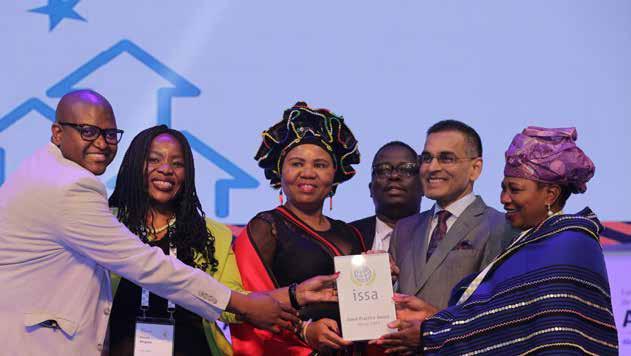
“We view the CSG as an investment the government is making in the lives of our children, especially those from poor and vulnerable households. The State continues to play a pivotal role in the social protection of children, ranging from social grants to free schooling and free healthcare amongst others.”
At the same awards ceremony, the South African Social Security Agency – a DSD agency – received two certificates of merit with special mention on the Social Relief of Distress for victims affected by floods in KwaZulu-Natal and the Social Relief of Distress: social assistance for people in distress
at the onset of the COVID-19 pandemic and beyond.
The agency also received a certificate of merit on the introduction of electronic deductions on funeral insurance premiums for social grants beneficiaries.
The ISSA is the world’s leading international organisation for social security institutions, government departments and agencies. It was founded in 1927 under the auspices of the International Labour Organization (ILO) and currently has over 320 member institutions from over 160 countries.
Minister Zulu emphasised the importance of sharing best practices on social security related matters to improve the wellbeing of all African people
and further reiterated the need to accelerate the implementation of reforms and foster cooperation among all stakeholders within the social development sector.
South Africa took part in the ISSA Regional Social Security Forum from 17 to 19 May 2023 in Abidjan. Minister Zulu participated in the joint session of the African Union(AU)-ISSA
Regional Social Security Summit that featured other African states, the AU Commissioner on Health, Humanitarian Affairs and Social Development and the ILO on 19 May 2023. The summit featured the of-
ficial launch of the Africa Social Security Institutions Coordination and Cooperation Forum in the framework of the activities of the AU.
Whilst in Abidjan, Minister Zulu met her counterparts responsible for employment and social protection, as well as solidarity and the fight against poverty, having recently signed a partnership agreement with the latter on comprehensive social security, poverty eradication and development welfare services.
During the Forum, South Africa showcased interventions implemented to ensure that the country's social security system provides the much-needed protection to vulnerable children.

Ongoing work in South Africa’s water industry is expected to not only ensure the provision of the precious commodity, but also to respond to challenges.
In the past year, the Department of Water and Sanitation (DWS) made progress in unblocking important reforms and major water resource infrastructure projects that had been delayed. Progress has been made on the decision to establish the National Water Infrastructure Agency (NWRIA), the reconfiguration of water boards and the catchment management agencies.
The agency is envisaged to undertake the building, operation, financing and maintenance
of national water resources infrastructure assets, whilst the department retains responsibility for planning, regulation, policy and price setting.
The agency also seeks to ensure sustainable, equitable and reliable supply of water from the national water resources infrastructure.
The DWS recently closed the extended public consultation process of the draft NWRIA Bill that will establish the agency. The department has reported that the National Economic Development and Labour
Council has put in place a task team to consult on the Bill and that the current lenders to the Trans-Caledon Tunnel Authority have requested an independent financial and legal review of the implications of the establishment of the NWRIA for their current loans.
“These processes are currently underway. When they are completed, we will be taking the Bill back to Cabinet with a report on the consultations, recommendations for any amendments to the Bill, and recommendations for the Bill to be submitted to Parliament,” the DWS Director-General (DG), Dr Sean Phillips said.
The department has also set up the Water Partnership Office, a ring-fenced unit housed within the Development Bank of South Africa (DBSA).
The office has been set up to support municipalities to put in place partnerships with the private sector. This is expected to enable more private sector investment in water services, and to enable municipalities to draw more on the expertise and management capacity in the private sector.
“Standard partnership programmes are being developed in the areas of non-revenue water, management of waste-water treatment works, water-use, and the general management of
the municipal water and sanitation function,” explained Phillips. The office is jointly overseen by the DWS, the DBSA and the South African Local Government Association.
In addition, the recruitment process for the appointment of a chief executive officer is underway in the office that is currently being managed by DBSA officials.
The DWS has also been working on reconfiguring the country’s water boards to improve their financial sustainability and scale. This work is being done to extend services to areas that are not currently serviced and to clarify institutional confusion caused by having multiple water boards serving the same areas.
Earlier this year, Parliament’s Portfolio Committee on Water and Sanitation expressed concern that as at 31 December

tively good state,” but were all affected by the problem of nonpayment by municipalities.
“Unless this problem is addressed, the financial sustainability of the water boards will increasingly be put at risk.”
The DWS is currently con-
tions or restrictions for nonpaying municipalities as well as collaboration with National Treasury to withhold equitable share allocations for municipalities not paying their accounts.
Reconstruction and Development Programme level of service in terms of water supply.
“However, the reliability of the water supply through municipal water distribution services has deteriorated markedly over the last ten years, so that only 68%

all areas that are not yet sup plied.
“For example, the department is working with Lepelle Northern Water and the Mopani District Municipality in Limpopo to ensure the installation of distribution infrastructure to communities in and around Giyani that have never had piped water.

“The department prioritises these projects with its Regional Bulk Infrastructure Grant and Water Services Infrastructure Grant which it allocates to municipalities,” he said.
This is done though ongoing engagement with municipalities.
“The Minister [of Water and Sanitation] has prioritised the municipalities with the most deteriorated water and sanitation services and in many of these the Minister and mayors have agreed on turnaround action plans which the department is supporting the municipalities to implement.”
The DWS is also addressing the issue through the strengthening of its regulatory functions for municipal water and sanitation service. It is working on revised minimum norms and standards for these services. It is also in the process of standardising its responses to non-compliance with these norms and standards across all its regional offices.
Water Service Act, 1997 (Act 108 of 1997) that will enable the Minister of Water and Sanitation to intervene more effectively where there is gross and persistent non-compliance with national norms and standards is also receiving attention.

Meanwhile the country has, over the years, seen more incidences of flooding, which have affected water services infrastructure.
National water resource infrastructure such as dams have withstood the floods well and the DWS has been releasing water from the dams to protect them as and when required in terms of the hydrological rules governing such releases.
In addition, the DWS is encouraging municipalities to design and build water services infrastructure with flood-resistance in mind. It is also encouraging municipalities not to allow the building of human settlements within the 100 year flood lines of rivers.
Meanwhile, the DWS has also cleared the backlog in the issuing of water-use licenses within 90 days as highlighted
This feat was achieved through cooperation between the DWS and Operation Vulindlela, wherein the department received technical support from Operation Vulindlela to implement a plan for the granting of wateruse licences within reduced timeframes.
The improved operating processes included training employees and and temporarily moving staff to regions with large backlogs of applications.
The department is also in the process of advertising and recruiting more employees for water-use licensing to ensure the processing of closer to 100% of new applications within 90 days.
“There has been a positive response from business and industry. However, they would like us to improve further, which we intend to do,” added the DG.
Established in October 2020, Operation Vulindlela aims to drive a far-reaching economic reform agenda for the country to shift its economic growth trajectory and enable investment and job creation.
–SAnews.gov.za
Treat or sterilize the water before drinking or cooking

HOW TO TREAT OR STERILIZE WATER
BOIL: - Bring water to boiling point for at least 1 minute.
-Boiling water is an effective way of making water safe.

TREAT: - Put 1 teaspoon of household bleach into 25 litres of water.

-Put 2 drops of household bleach in 1 litre of water.
-Wait for 30 minutes before use.
-Always store your treated water in a clean, covered container.
Ensure proper hand hygiene
• Before, during, and after preparing food
• Before and after eating food or feeding your children
• After using the toilet
•
• After taking care of someone who is sick with diarrhoea
Cook food well and keep it covered
• Eat foods that have been thoroughly cooked and are still hot
• Peel fruits and vegetables
• all the way through.
• Avoid raw vegetables and fruits that cannot be peeled.
gain access to relevant information.
“It also provides channels for citizens to engage with the administration on issues that matter most to them. The GCIS will develop content for its online accounts and develop streams of information that will empower citizens to access social and economic opportunities.
“We will develop content for our own print media and for its audiovisual outlets, as well as through advertising, the purchasing of which we coordinate on behalf of departments and agencies,” the Minister said.
As government navigates through the present day challenges, it has committed to provide citizens with communication informed by its work to address load shedding, unemployment, crime, the rising cost of living, corruption and service delivery.
“We will sustain the flow of
information on these priorities through, among others, the regular briefings we present to the nation on all the priorities. The Government Communication and Information System (GCIS) will develop content for its online accounts and develop streams of information that will empower citizens to access
social and economic opportunities,” Minister in The Presidency, Khumbudzo Ntshavheni said.
Delivering the GCIS Budget Vote, for the 2023/24 financial year, the Minister emphasised that communication plays a fundamental role in bridging the divide between government and citizens, as it allows the public to

The GCIS will work with departments, provinces, stateowned enterprises and partners in civil society to deepen communication of government’s programmes and the nation’s promise as a destination and partner for tourism, trade and investment.
She also committed to redouble efforts to strengthen coordi-
nation of the GCIS, and harness partnerships with labour, business and civil society.
Government will also intensify community engagements; increase the use of digital platforms to reach a wider section of the population; improve communication in all official languages; and empower community radio stakeholders as a local medium of communication with a national footprint.
“Amid the challenges we face, we understand the need for our messages to be substantiated by the underlying performance of the administration at the national, provincial and municipal level.
“With this in mind, we will consistently involve the implementers of government programmes in our communications roll-out, as part of ensuring that communications hold implementers to account.
“Our long-term programme of communication will be inspired by and serve as a support mechanism to our realisation of the National Development Plan, the Economic Reconstruction and Recovery Plan (ERRP) and
the Five-point Energy Action Plan,” the Minister said.
During the 2023/ 24 financial year, Brand South Africa (BrandSA) will work to strengthen the country’s brand position and reputation as part of the ERRP, and the Better Africa and Better World, and Leaving no One Behind campaigns.
“As South Africa ventures into the opportunities presented by the African Continental Free Trade Agreement and a continental market of more than a billion people, we will communicate programmes that support regional integration and the African Agenda 2063.
“[The]GCIS will put its best foot forward later this year in hosting an expected 200 journalists from our continent and elsewhere, who will constitute the BRICS [Brazil, Russia, India, China and South Africa] Media Forum, from 18 to 19 August 2023.
“Media organisations and institutions from BRICS, developing countries and emerging economies have had in-depth exchanges and initiated practi-
cal cooperation that drives the forum,” the Minister said.
She said the BRICS Forum has played a vital role in strengthening mutual learning among participants and promoting the BRICS spirit of openness, inclusiveness, cooperation and mutual benefit.
The Minister affirmed that the media remains a key stakeholder, and it is through this relationship that government is able to communicate and reach the majority of citizens.
“During this financial year, we intend to strengthen these relations and, as such, we are looking at lessons that we learnt during the COVID-19 period, which yielded very solid relations between government, particularly the GCIS, and the media.
“This partnership is essential to ensure that citizens have access to information, which is the heartbeat to the health of our democracy, the development of our country and an enabler to government to get into every home, despite the distance and time,” she said.
Minister Ntshavheni noted the decline in advertising revenues and circulation figures as one of
the biggest challenges faced by the private sector and community media alike.
"The long-term sustainability of any medium is critical for the GCIS, as government relies on these platforms to disseminate government information to the citizens," she said.
The GCIS has been allocated R750.746 million for the 2023/24 financial year and R782,847 million for 2024/25. The department’s current budget of R750.746 million for the 2023/24 financial year is allocated as follows:

• Transfers and subsidies to the entities: R256.6 million (34%), of which R219.526 million is for Brand SA and R37.039 million is for the Media Development and Diversity Agency;
• Capital budget (1% of GCIS budget) R8.2 million;
• Goods and Services (27%) R201.8 million; and
• Compensation of Employees (38%) R284.1 million.
he first of South Africa’s metropolitan municipalities are online planning tool for climate resilience that has been developed specifically for their context. The first metro to benefit was the City of Tshwane, while work for the eThekwini Municipality
www.greenbook.co.za) was first launched in 2019, offering planning support and evidence around climate change, risk and vulnerability to all local municipalities in South Africa. Funded by the Council for Scientific and Industrial Research (CSIR), National Treasury and the International Development and Research Centre, the tool supports local government in South Africa with developing climateresilient cities and towns. Its research methodologies were all co-developed with stakeholders from government and the scientific community.
Since the launch of The GreenBook, the research team, together with stakeholders, have identified a need for a more detailed view for metropolitan municipalities. Given the uniquely complex nature of these municipalities, a different approach to planning support is needed in these spaces. The GreenBook MetroView was conceptualised to address
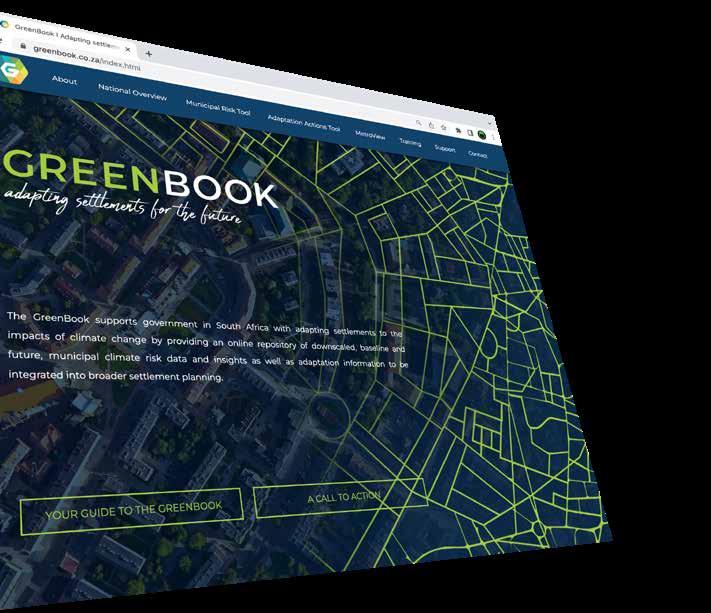
metropolitan planning needs and developed for the City of Tshwane as a proof of concept in 2020/21 through CSIR research and development funding, in close collaboration with the City of Tshwane, and with input from National Treasury’s Cities Support Programme.
The investment resulted in The GreenBook MetroView, a planning support system that provides spatialised and quantified scientific evidence of climate change projections, multidimensional vulnerability indicators, population-growth projections and climate hazard risk modelling to assist practitioners, policymakers and decision-makers to effectively inform and support climate risk and vulnerability assessment related planning processes.
“The GreenBook MetroView creates a shared understanding, across the different sectors and departments in a city, as well as other stakeholders, of the possible impacts of climate change and the decisions that need to be made to respond to it.
“The spatialised communication of climate-related risks and vulnerabilities will primarily inform land-use planning and spatial investment-targeting processes, while the adaptation and mitigation actions speak to the responsibilities across
all sectors and departments in the metro,” explained CSIR principal researcher and urban and regional planning expert Willemien van Niekerk.
The MetroView edition comprises two tools. The Climate Risk and Vulnerability Profile Tool provides a current and 2050 picture of climate change and its related impacts on three levels namely; municipal, planning region and ward level.
The tool consists of six sec tions, including an overview, a vulnerability section, climate information, a section on hazard and exposure, coping capacity, and climate risk zones. These zones provide spatialised and quantified climate risk for the city. The Tshwane climate risk and vulnerability profile is available online at https://tshwaneriskprofile.greenbook.co.za/
The Climate Action Tool consists of various adaptation actions, as well as greenhouse gas mitigation actions. Each of the actions within the tool speaks to themes that relate to specific city functions that should consider climate change adaptation, greenhouse gas mitigation and disaster risk reduction. The themes are linked to certain strategic priority outcomes as identified by the city. The City of Tshwane’s climate action tool is

based on its climate action plan and reflects on the functions, outcomes and actions as contained in the climate action plan.
The Tshwane Climate Action Tool is also available online at https://tshwane-climateactions. greenbook.co.za/
While each of the two tools in the MetroView can be used on its own, they are complementary and were designed to be used together for maximum impact.
“If you have explored the climate risk and vulnerability profile of a metro, you can also explore the range of adaptation actions available to be considered for integration and implementation in various local strategic and sector
plans. Ultimately, you do not just want to know and understand the likely challenges, but consider the possible interventions as well,” added Van Niekerk.
The second metro to benefit is the City of eThekwini. The CSIR, in collaboration with National Treasury’s Cities Support Programme, Absa, and the City of eThekwini, is developing a MetroView for the city.
As part of the GreenBook research and development programme, the team intends to develop a MetroView for each of the metropolitan cities in the country over the next few years, building on existing partnerships with government and industry.
the readiness to implement NHI.
The President told delegates that to achieve Universal Health Coverage (UHC), government must prioritise several key areas, including funding.

“Resources will need to be pooled to provide access to quality healthcare for all, starting with government funding health services that have experienced a massive budget reduction in the past few years.
“We will also need to mobilise resources to address perennial problems such as HIV, TB and other non-communicable diseases.”
Even though South Africa was negatively affected by COVID-19, the President believes the health systems have proven to be remarkably “resilient”.
He acknowledged that the pandemic disrupted the implementation of the nine pillars of the Presidential Health Compact, which lays a foundation for a five-year roadmap for health systems strengthening reforms towards accelerating UHC.
Government is forging ahead with the National Health Insurance (NHI) to enable the country to ensure every citizen receives quality health services, correct diagnosis and free treatment at the point of care. This was said by President Cyril
“Such a healthcare system should be adequately staffed with well-trained and motivated healthcare professionals sup -
ported by effective management and leadership,” he said.
The summit reviewed the implementation of the interventions agreed to during the 2018 summit, assessed the performance of the health system against the Health Compact, and evaluated
“But work did not grind to a halt. On the contrary, it continued despite the difficult terrain we were navigating at the time.
“We were also fortunate in that we put the legislative wheels for NHI in motion before the pandemic struck.”
He announced that the NHI
Bill, which was introduced to Parliament in 2019, would be debated in the National Assembly in May before being considered in the National Council of Provinces.
He also explained that UHC falls under the United Nation’s Agenda 2030 for Sustainable Development – to ensure that everyone can access quality health services without incurring financial hardship, promote health equity and reduce health disparities.
He believes it will also provide essential health services to all individuals regardless of their socioeconomic status or geographic location.
“To achieve this, health systems need to be strengthened, health coverage needs to be expanded, and out-of-pocket expenses for health services need to be reduced.”
He said government cannot do it alone and will rely on collaboration between the State, civil society organisations, the private sector and other stakeholders.
The President raised concern about the disparities between public and private healthcare, which continue to increase.
“Moreover, despite efforts to
integrate health departments, quality of healthcare is still largely influenced by where you live.”
“It [NHI] aims to reduce health disparities between different population groups and regions of the country and to protect individuals and families from the financial burden of healthcare expenses.
The President also called on strong governance and leadership by the Department of Health to ensure that the entire health system, public and private, is well-managed, transparent, and accountable to the public.
He reiterated government’s commitment to investing more
in training programmes for healthcare professionals and increase staffing levels to meet the population's needs and ensure essential medicines and medical devices are available.
He said the highly publicised situation at Tembisa Hospital and many such examples in various provinces are unacceptable.
“We must protect whistleblowers to ensure we can root out corruption that has become endemic in our health system.”
President Ramaphosa said he hoped that this year’s United Nations General Assembly in September will be an opportune time to share progress made by the country towards the NHI.

“We have been able to learn
from the experiences of others as well as adopt best practices in implementing UHC policies and programmes.
“Our goal as South Africa is to create a healthcare system that is the world's envy; that is accessible, efficient, and effective in meeting the needs of all citizens.”
Recommendations from the summit included the need for collaboration between the private and public health sectors, the need for better assessment and monitoring tools to measure the functionality of clinics and hospitals and creating incentivisation schemes for provinces that manage their health budgets efficiently.
Basic Education Minister
Angie Motshekga says her department is engaging with National Treasury to fund an integrated national reading literacy strategy.
The Minister said this while tabling the department’s Budget Vote for the 2023/24 financial year.
This comes after a report on the 2021 Progress in International Reading Literacy Study (PIRLS) revealed that 81% of South African Grade 4 pupils cannot read for meaning.
PIRLS is coordinated on a five yearly basis by the International Association for the Evaluation of Educational Achievement (IEA) and is the global standard for monitoring reading achievement at Grade 4.
The Minister highlighted that in 2019, the sector had reached consensus on 10 pillars to anchor its 2019 National
Reading Strategy.
She said that from their continuous consultations, and lessons learnt from the regional and international assessment studies, there was an emerging view that they should reduce the 10 pillars to four key interdependent strands.
These are: explicit reading literacy policy; skilled and agile teachers; age-appropriate and culturally relevant learning and teaching support materials; and involved parents and communities.
“This approach is critical, as the PIRLS 2021 has also observed that learners with higher home socio-economic status had much higher achievement than learners with a lower socio-economic status.
“Therefore, the consensus that the implementation of an integrated national reading literacy strategy must be well
resourced is justified. We are engaging National Treasury in this regard,” she announced.
Minister Motshekga added that she had requested researchers to analyse the impact of the COVID-19 pandemic on the country’s basic education system, the lost ground and the return of the schooling system to its earlier improvement trajectory.
The researchers reported that prior to COVID-19, the country had seen progress in the reading abilities of children.

“According to the PIRLS, reading in Grade 4 had improved substantially between 2006 and 2016. Between 2011 and 2016, South Africa saw the second-fastest improvement among all PIRLS participating countries, after Morocco,” the Minister explained. By the end of 2021, the aver-
age Grade 4 leaner could read. The average Grade 3 learner could read before the pandemic.
She noted that there had been a loss of one year of learning, meaning the country slid backwards in terms of the PIRLS progress by a few years.
“The overall reading scores of our Grade 4 learners, who participated in PIRLS 2021, dropped from 320 points attained in 2016, to 288 points in 2021.
“Our Grade 4 girls performed better, at 317 points, than their boy counterparts, who achieved 260 points. PIRLS 2021 shows that the longer the children stay in school, the better their performance,” she said.
This is supported by the
PIRLS 2021 Grade 6 score, which shows an upward shift of 96 points when compared with the Grade 4 score.
The Minister added that her department will be embarking on report back and engagements sessions with its critical stakeholders, including renowned local and international scholars, to ensure that they all understand the conundrum about reading for meaning as different from oral performance in reading.
While acknowledging the devastating effects of COVID-19, she said these assessment studies continue to sharpen their understanding and plans on improving the sector’s performance on reading for meaning.
 Photo by Gaelle Marcel on Unsplash
Photo by Gaelle Marcel on Unsplash
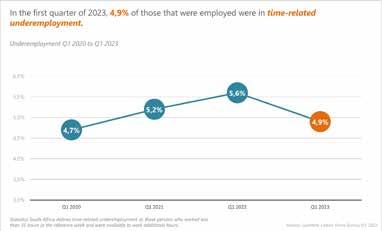
South Africa’s unemployment rate in the first quarter of 2023 was recorded at 32.9%, and is among the highest in the world. According to the Quarterly Labour Force Survey (QLFS), this is an increase of 0.2 of a percentage point compared to the fourth quarter of 2022.
While the unemployment rate may be high, there is also an increase in time-related underemployment. Time-related underemployment refers to all persons in employment who wanted to work additional hours, had worked less than a specified hours threshold (working time in all jobs) and were available to work additional hours given an opportunity for more work.
Statistics South Africa defines time-related underemployment as those persons who worked less than 35 hours in the reference week and were available to work additional hours.
Time-related underemployment rate is defined as the percentage
of time-related underemployed persons to employed persons. In the first quarter of 2023, 4.9% of employed persons were in timerelated underemployment. This
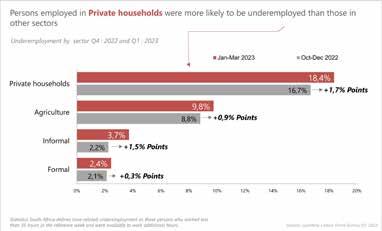
is consistent with underemployment recorded in Q1:2020 preCOVID-19 with a slight increase of 0.2 of a percentage point over these years.
The prevalence of underemployment increased during COVID-19, increasing from 4.7 % in Q1:2020 to 5.2% in Q1:2021, followed by a significant increase in the proportion of persons affected by time-related underemployment in the first quarter of 2022 at 5.6%.Quarter-to-quarter changes indicate an increase by 0.5 of a percentage point in time-related underemployment, from 4.4% in Q4:2022 to 4.9% in Q1:2023.
Although the underemployment rate increased for both females and males, females were more likely to be in time-related underemployment (6.3%) than their male counterparts (3.9%). Also notable is the persistent vulnerability of women in the labour market, with the time-related underemployment for females being higher than the national average.
Females may desire to work more hours; however, various reasons may force them to work
fewer hours than they desire: their disproportionate care work could make them less likely to be available to work more hours or take up an extra job; there may be other family responsibilities and commitments; or they may be discouraged to a greater extent in their job search compared to their male counterparts.
With the highest time-related underemployment rate of 5.9%, Black Africans remain vulnerable in the SA labour market as they desire to work more hours. Indian/Asian and White population groups have the lowest time-related underemployment rates (0.9% each). The only decrease in time-related underemployment was recorded among the Indian/Asian population group (1.7 percentage points).

With the exception of Free State, which showed a decline of 1.7 percentage points quarteron-quarter, all other provinces recorded an increase in the percentage of people affected by time-related underemployment. Employed persons from Limpopo, the Eastern Cape and Mpumalanga recorded the highest prevalence of time-related underemployment. The Western Cape, North West and Gauteng recorded the lowest underemployment rate in the first quarter of 2023.
Graduates are the least affected by underemployment, recording the lowest underemployment rate at 1.2% for Q1:2023

As with the unemployment
4.9%. The lowest underemployment rate is recorded in the age groups 35 to 44 years and 55 to 64 years, both at 4.6%.
Persons employed in private households were more likely to
highest underemployment rate at 9.8% in Q1:2023 and 8.8% in Q4:2022.
The 19th International Conference of Labour Statisticians defines labour underutilisation as the mismatches between labour supply and demand, which translates into an unmet need for employment among the population. An important component of labour underutilisation is time-related underemployment, which can bolster the analysis of the labour market’s effectiveness. The international standard defines persons in time-related underemployment as all persons in employment who, during a short reference period, wanted to work additional hours, whose working time in all jobs was less than a specified hours threshold, and who were available to work additional hours given an opportunity for more work.
rate, young people experience underemployment at far higher rates than older persons. For the first quarter of 2023, the underemployment rate was 6.3% for those aged 15 to 24 and 5.2% for those aged 24 to 34, which is higher than the national rate of
be underemployed than those in other sectors. The underemployment rate for those employed in private households was 18.4% in Q1:2023 and 16.7% in Q4:2022, an increase of 1.7 percentage points quarter-on-quarter.
Agriculture recorded the second
According to the latest data, the first quarter of 2023 indicates an increase in the prevalence of time-related underemployment. Statistics on time-related under-employment are useful as a supplement to information on employment and unemployment, particularly the latter, as they enrich an analysis of the efficiency of the labour market in terms of the ability of the country to provide full employment to all those who want it.
As South Africa and South Korea's bilateral relations continue to get stronger, young people from the two countries are reaping the benefits. One such young person is Ayanda Pieters (26), a South African living in South Korea. She is one of the many South Africans teaching English in South Korea.
Last year, the two countries marked the 30th anniversary of their diplomatic relations.
Pieters has been teaching in South Korea for just over a year. She says that at the moment “South Africa is the only country in Africa that is recognised as an English native speaker by the South Korean government”.
The Korean government has programmes such as EPIK and hagwons which provide after school services like English teaching. Besides South Africa, these programmes are open to citizens of the United States of America, the United Kingdom, Canada, Ireland, Australia, New Zealand and India. Travelling to South Korea has also been made easy. There is a visa waiver for South African tourists and those engaging in business for a short period. The visa waiver called K-ETA was introduced in April
2022. According to the South Korean Embassy website, the K-ETA system allows South Africans to authorise their trip to Korea through an online application.
A visa is, however, required for longterm stay for work, study and relocation. It can be obtained from the South Korean Embassy in Pretoria.
In addition to South Africans teaching in South Korea, the South African Embassy in Seoul, South Korea’s capital city, states that: “many Korean students travel to South Africa as an alternative destination for English learning”.
Growing up, teaching was not part of Pieters's career aspirations, but the diplomatic relations between South Africa and Korea opened a whole new world of opportunities for her and many South Africans.
Originally from Newcastle in KwaZulu-Natal, Pieters holds a National Diploma and a Bachelor of Technology Degree in Journalism from the Tshwane University of Technology. While at the university she was a student assistant and an editor for the institution’s publication.

However, when she completed her studies, she struggled to find a job as a journalist. With her dream job deferred, it was time for her to realise her other calling.
“I come from a lineage of teachers and I wanted to avoid the profession at all costs. But somehow I found myself gravitating towards teaching. Before I went to university I was an English tutor. So when I could not find something stable in journalism, I gave in to fate and took a leap of faith.”
In 2022, she moved to South Korea to teach English.
"I work at Hillside Collegiate in Ulsan, a coastal city in South Korea. I teach Grade 1s,” she says.
Pieters says when she initially started teaching, the task seemed insurmountable.
“I taught five-year-olds who had very little to no understanding of the English language and
it was very challenging. I then learnt how to use non-verbal communication to get through to them. One day it was like they woke up and were suddenly able to use English. Being able to communicate with them was very fulfilling,” adds the proud teacher.
Pieters has settled in and is feeling more at home.
“At first, I did not think I would enjoy teaching as much as I currently do. The highlights of my career are the letters and messages of appreciation I get from parents. They give me validation that I did not make a mistake by choosing teaching over what I went to school for.”
She was even recently reminded about the 2010 Vuvuzela legacy by a Korean friend.
The instrument became so popular in 2010 that it was entered into the dictionary.
Pieters’s biggest culture shock was that a lot of people keep to
themselves. “I miss random human interactions especially from the younger generation. I miss people who are my age, who will just randomly chat me up,” says the young teacher.
Pieters says she has had to adjust to Korea’s ppalli-ppalli (fast-fast) culture. “This means that decisions are made and implemented right there and then”.
She says that she admires the
patriotism of South Koreans and how they keep their environment clean, “they look after their environment. Recycling here is taken so seriously. I like that so much”.
But as the saying goes, no matter how far you travel, there is no place like home.
“I miss the weather and the great air quality we have in South Africa,” Pieters concluded.
More on South Africa and Korea’s bilateral relations: “Increasingly the main focus of the bilateral relationship is on economic and business links. Today Korea is South Africa's 4th largest trading partner in Asia. South Africa is Korea's largest trading partner in Africa. While complementary, there is considerable opportunity for the expansion and diversification of trade. South Africa is well positioned to supply South Korea with the following products: mining and metal, steel, automotive components, agro-processing, textiles, jewellery and chemicals, pharmaceuticals and cosmetics.” - South African Embassy in Seoul.

“I taught five-year-olds who had very little to no understanding of the English language and it was very challenging. I then learnt how to use non-verbal communication to get through to them.”
It is the season for layering. With so many clothes needed to keep your warm, choosing how to put it all together can be quite challenging. I am going to show you how to get more out of every item you purchase this season.
The simplest way to coordinate winter items and to get layering right, is to use colour as a guideline. Our first colour is black –sliming, sophisticated and perfect for every occasion.
Tip: Black goes well with white, to help tone down its intensity.
To get the most out of your wardrobe, feel free to buy a summer dress and layer it with stockings, a shirt or turtleneck underneath, then throw on a black coat on top.



Shades of neutral colours always pair well together – white, cream, beige, grey and nude.
Tip: The classic white shirt can be worn with wide leg pants or jeans; or unbuttoned with leggings or a tube skirt for a pretty preggy look.



Hoodies are the best way to be comfortable and look cool during your pregnancy. You can buy one size bigger than usual to get the look.
* Prices correct at the time of writing

Femininity has never been more celebrated. With Viva Magenta as the PANTONE Colour of the Year 2023, expression and bravery are the message behind this lady-like shade.

Tip: Do not be afraid of dressing in all pink or red; mix lighter shades with darker ones to add depth to the monochrome look.
Instagram: @neovictoriarangaka or @neobynvr.
1. Ostrich Feather Elasticated Pant and Lined Blazer in Linen Check. Each R899: Me&B, 44 Stanley or www.meandb.shop
2. Maternity inner support tank dress, R299: www.superbalist.com
3. Black Tights with Animal Mesh Detail, R299: Me&B, 44 Stanley or www. meandb.shop
4. Embossed Dome Bag (black), R2 000: www.galxboy.co.za
5. Faux Leather Pinafore Dress, R799: Woolworths

6. Nsuo Drawstring Oversized Shirt, R3 950: Asantii, Sandton City


7. Thebe Magugu Hoodie, R1 149.00: Shelflife
8. Milk Embroidered Denim Jacket, R899: Me&B, 44 Stanley or www. meandb.shop

9. Sun Ava Bone, R500: www.galxboy.co.za

10. Exposed seam detail funnel neck (purple), R244: www.superbalist.com

11. A-Line Boucle Skirt in Pink/Red, R599, Lined Jacket, R1 499 and Cerise Pink Beret, R299: Me&B, 44 Stanley or www.meandb.shop Emolyne Johannesburg Vibrant Pink Red Velvet Lip: www.emolyne.com
* Prices correct at the time of writing
Photos: Chef Moleleki
Chef Moleleki Lelimo encourages everyone to eat balanced meals because they contribute to the well functioning of the human body and help to build the immune system, lowering the risk of getting ill.
“Vegetables provide important minerals and fibre, which
are good for dietary requirements,” he says.
In this edition, the chef shares one of his favourite go-to recipes – coconut chicken. The meal is served with blanched vegetables and couscous. He prefers blanched vegetables because they are
rich with nutrients, have beautiful crunchy texture and are good for the digestive system.
“This is a flavourful family style meal that will win the hearts of your loved ones. It is simple and cost-effective, and you can have it every week,” he says.

Ingredients:
• Chicken thighs and drumsticks.
• 3 cloves of garlic.
• 1 onion finely chopped.
• Red bell pepper chopped in chunks.
• Salt and pepper.
• 1 teaspoon cayenne pepper for heat.
• Dried mixed herbs (preferably oregano).
• 1 tablespoon of tomato paste.
• Diced canned tomatoes.
• Coconut milk 400 ml.
• Chicken stock.
• Phyllo pastry.
• 3 tablespoons of butter.
• 3 tablespoons of olive oil.
Method:
• Pat dry the chicken using paper towel and place in a bowl.
Season with salt, black pepper,
paprika.
• Place a skillet or pan on medium to high heat with olive oil and sauté the seasoned chicken till lightly crispy and golden brown.

• Remove from the skillet or pan and place in an oven-proof
about 35 minutes or till cooked through.
• While the chicken is baking, prepare the sauce in the same pan used to brown the chicken.
• Sauté onions and peppers till onions are translucent, then
add garlic and sauté further till nicely fragrant.
• Add tomato paste and mix well.
• Add diced tomatoes and let simmer for a few minutes. At this stage, taste the acidity in the tomatoes and add a bit of sugar if necessary. Add dissolved chicken stock and simmer further till slightly reduced.
• Add coconut milk and cook till the sauce is nicely thickened, lastly add chopped coriander and preserve some for garnish.
• Taste for salt and pepper, and adjust if necessary.
• When the sauce is done. The chicken should be cooked through. Pour it over the chicken in the same pan it is baked in (we do not want lose any flavours, set aside).
• Brush 2 or 3 sheets of phyllo pastry generously with butter, roughly place it over the one side of the chicken in the oven. This step is optional, but it adds a bit of crunch to the meal and eye catching if you are a show stopping
entertainer. Return the pan to the oven and bake further till the phyllo ribbons are golden brown. Remove from the oven and garnish.
Ingredients:
• Green beans.
• Rainbow carrots.
• Radishes.
• Broccoli.
• Sweet corn.
• Sesame oil.
• Toasted Sesame seeds.
• Light soy.
Method:
• Blanche all vegetables individually and place in a bowl of ice water, this prevents the vegetables from overcooking and helps preserve colour. When completely cooled, remove from the ice water and place on a strainer.
• When ready to serve, heat up a large pan and sauté vegetables with sesame oil for about 3 minutes. (This step is for bringing them back to heat and flavouring). Once fragrant and warmed, drizzle the soy
sauce in, toss sesame seeds then transfer to the serving dish.
Ingredients:
• 1 cup couscous.
• 1 onion finely chopped.
• Bell peppers, diced.
• Black beans.
• Chicken stock.
• Parsley finely chopped.
• Salt and pepper to taste.
Method:
• Place couscous in a bowl. Pour over hot chicken stock covering the entire couscous, cover and set aside.
• While the couscous is absorbing all that stock, sauté the onion and peppers till nicely soft.
• Once the couscous has absorbed all the liquid, use a fork to stir and loosen it up, then add the sautéed items.
• Add ½ cup black beans and parsley.
• Add salt and pepper to taste. This is a meal to be enjoyed with a glass of crisp cold chardonnay.
*Lelimo is a sous-Chef at one of the high-end restaurants in Cape Town and he is originally from Excelsior in the Free State. He also does private functions. You can check out some of his work on Instagram: @molelekiskitchen


With the highest number of Blue Flag beaches in the province and a wealth of unique nature-based activities, holidaymakers are spoilt for choice along the KZN South Coast. And now, planning everything from accommodation to family-friendly outdoor activities has never been easier.

Visitors just need to download the newly revamped, Explore KZN South Coast App, free on Google Play or Apple App Store.

“We are so fortunate that KZN South Coast enjoys a year-round subtropical climate, boasts world-famous dive sites, Blue Flag beaches and great hiking trails, making it an incredibly popular tourism destination,” commented the Chief Executive Of-

ficer of South Coast Tourism and Investment Enterprise (SCTIE)
 Phelisa Mangcu.
Phelisa Mangcu.
“To better assist holidaymakers
who are planning a trip to explore these once-in-a-lifetime sites and experiences, we have relaunched our innovative Explore KZN South Coast [App]," she said.
Mangcu added that, “the platform features interactive digital Visitor Information Centre (VIC), Google Maps connectivity, an updated events calendar, scenic routes, extensive tour information, and not-to-be-missed outdoor adventures found along the Paradise of the Zulu Kingdom. By virtue of the fact that the App is connected to our destination website, you never miss out, no matter what device you are using. In addition, it is completely free for all users.”
Visitors can simply go to the Google Play or Apple App Stores to download the newly updated KZN South Coast App or load the new version. Once downloaded, visitors have access to all relevant tourism information at their
fingertips, any time of day, wherever they are. The App features:
• Direct access to operators by simply clicking on the contact to immediately call or email for more information.
• GPS coordinates to navigate to the best sites, eateries, venues and more on the KZN South Coast.
• The constantly updated events calendar, featuring the best local markets, social events, festivals and shows.
• Hundreds of things to ‘Sea’ and do, including Blue Flag Beach offerings, top fishing spots, charter boats, microlight tours, cultural excursions, hinterland tours, hiking and biking trails, and extreme adventures.
• Various accommodation
offers throughout the KZN South Coast, from seaside campsites to 5-star resorts.
• The region’s best eateries, cafés, fast food spots, restaurants, pubs and other dining options.
• A wide selection of retail and services found in the area.
• The latest local specials and tour packages offering fantastic deals.
• The best local attractions such as 11 top golf courses, two world-renowned dive sites, nature reserves, lagoons and waterfalls. Alongside the many benefits for local residents and holidaymakers, the Explore KZN South Coast App also provides tourism establishments with a far-reaching marketing platform that will drive business.

To find out more about the KZN South Coast’s tourism offerings:

• Download the free App from Google Play and
• Follow the South Coast Tourism on Facebook; South Coast Tourism and Investment Enterprise on YouTube; @infosouthcoast on Twitter or Instagram and Info Ugu South Coast Tourism on LinkedIn.
• Visit the SCTIE website to check out the events calendar.
• Check the KZN South Coast Meeting Planner Guide. Follow the hashtag #kznsouthcoast #extendyourstay #endlessopportunities.